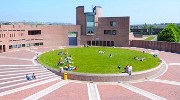Address by Mr. T.W. Russell, Vice –President, Department of Agricultural and Technical Instruction
(As reported in the Cork Examiner Wednesday 17th January 1912)
It is a great pleasure for me to be present today at the opening of your Technical School and Institute. It is one of those occasions upon which everyone concerned with technical education in Cork can congratulate themselves, and I am glad to be here with my friend Mr. Fletcher, to bear testimony to the admirable work carried on under somewhat disadvantageous circumstances in the past and which will, doubtless, in the new circumstances greatly advance both as regards quantity and quality.
You have now in this city a splendid educational building (hear, hear). You have in Dr. Grindley not only a capable but a supremely able headmaster and you have in the youth of Cork a constituency upon which he and his staff can operate without difficulty and with inestimable advantage (applause).
Speaking generally, the progress of technical education in Ireland has been of a really remarkable character. Much of it has gone on without observation. Ten years ago there were probably no more than a dozen technical schools. Today there are many. What is really a new profession has sprung up in the country. It is not alone in the great cities like Dublin, Belfast and Cork that this new work has gone ahead but in many villages there are classes in which valuable instruction is being imparted. This is comparatively unexciting work. It does not always bulk largely in public estimation. Sometimes it is even challenged but I rejoice to know that it is going forward everyday and it is limited only by the money we are enabled to spend on it.
Here in Cork you occupy a great position. You have this new building erected without aid from any building grant supplied by the Treasury. I do not enter at this moment into this vexed question. I did my best to press its urgency on the Chancellor of the Exchequer some time ago, when there was a chance of something being done. To-day resolutions are being sent out in favour of a grant for this purpose, but anyone who can appreciate the present position of affairs in Ireland, who realises that the financial questions between England and Ireland has been considered by a Committee advisory of the Cabinet when the accounts have practically been made up as between the two countries pending a settlement of the question of Irish Governmen; I say anyone who takes these facts into consideration may make application to the Treasury for the purpose, but those of us who know the facts know that those applications cannot be favourably received or answered.
You have not waited. You have got your building and have now to work it, to work it under high pressure if necessary. The Department is not always able to do everything it would like to do by way of helping such as this, but I think it will be admitted that in the case of Cork we have strained points to be of assistance to you, and we greatly rejoice that the result is what it is (applause).
Let us glance at the work that is now being done here. You have in the first place a School of Commerce connected with this institute. Now if technical education is to be worked on right lines the education ought to have some relation to the industries connected with the place where it is given (hear, hear). I think that it is a great matter for the people of Cork that they have this School of Commerce. You are to a very considerable extent a commercial city, and the youth of Cork if they are to remain here, must to a certain extent receive a commercial education and be educated along commercial lines. On every occasion on which I have visited Cork I have nothing but praise of your School of Commerce (applause). It has an admirable staff. It is splendidly worked, and the education afforded as a complement to that given in the primary and other schools of the city cannot fail to improve the chances in life of those who attend the School (hear, hear).
I may be told that primary schools ought to supply this need. My answer is that they do not. It is of importance to a young man who has made up his mind to be a clerk in a business house that he should be taught business methods, that he should understand two things in addition to the ordinary work of the office. He will be worth much more to his employer and to himself if he can write shorthand, if he can do typewriting. Both of these accomplishments are absolutely necessary in the business life of to-day – necessary in our commercial offices, necessary in our Government departments. What I would do without a staff of shorthand-writers and typewriters in the Department I do not know. One thing is certain – people would require to wait a good while for answers to their letters; they have been known to say they had to wait a good while as it is. They would have to wait longer. Here, at all events, is one branch of your work which has a bearing upon the needs of the city – on its commercial life and in this respect at least it fulfils the conditions rightly imposed upon all technical education.
On the industrial side, and apart from what may be called the scientific aspect, let us see how it operates. You have all kinds of classes in this institute. Here young men beginning or actually engaged in industrial life are taught how things ought to be done.
I have heard a good deal in the last year or two of different classes in Cork. You have a tailoring class for example. It has been difficult to satisfy the Department as to a teacher, but there is no lack of students. In that class men engaged in the tailoring industry receive valuable education which tends to make them better tailors than they would be without it.
There are also classes in bootmaking and printing. These may not be as successful as we could desire but they fulfil at least the primary function of technical education, and they have the strictest relationship to the industries of the district (hear, hear)
It is not the function of technical education to make men tailors, bootmakers or printers. It is its function to make a man a better tailor, a better bootmakers and a better printer than he would be otherwise.
There are classes in mechanical engineering and physics – most valuable to a city like this which has within its purview Haulbowline and other places requiring this special form of education.
And leaving these, what people would call larger questions aside, there are the domestic economy classes, which affect perhaps more closely the masses of the people than any other part of our work. Much has been said and written on the question of higher education for women. I do know not that I have extensive sympathies with good deal of what is going on now in what is called "the world of women" The education of women as it is carried on opens up more than one grave problem.
I am all for the higher education of women up to the point where that education can be of service to her. If a young woman desires to become a teacher; if she desires to enter on a path of life where higher education is necessary; even if she can afford it - should she desire the wider outlook such an education will give her - I go fully with her aspirations.
But when I come to examine a country like Ireland where the great majority of the young women of the day, if they stay at home - and I am glad to know they are not leaving in such numbers - have a clear prospect before them of being the wives of farmers, shopkeepers and of labourers, the case to me is quite clear. In all such cases a diploma in domestic science will be of far more use than a degree in arts; and for the wife of a farmer, a shopkeeper or a workman, it will be inestimably better for her and better for Ireland, that she would know how to manage a family and to cook a potato well than to play a piano badly (applause).
And here comes in the importance of our domestic economy classes in these schools. They are not schools, as some people suppose, for the mere teaching of cooking. They are schools for the making of good housewives. They are school where in addition to cooking, cleanliness and good order, hygiene, and sanitary science are taught and these are all vital interests of to-day. It is in these directions that women can play a really great part in the present and in the future.
Now you are doing all this in this establishment in Cork. Doing it under some difficulties but doing it remarkably well (applause). You must go on and try to do it even better.
Just let me say this in conclusion. There are some very distorted ideas of education abroad. Education of any kind, if it is to be of advantage to the youth of this or any other country, must aim at forming character. The longer I live the more firmly I am convinced that what makes the great difference between men and women – between nations and races – is character. The education that does not realise this and which does not seek to form and to build up character, misses what ought to be really its great aim and end.
On behalf of the Department which I represent here today I wish you a successful future in this great work, and I promise you the heartiest co-operation in all your efforts (applause).






